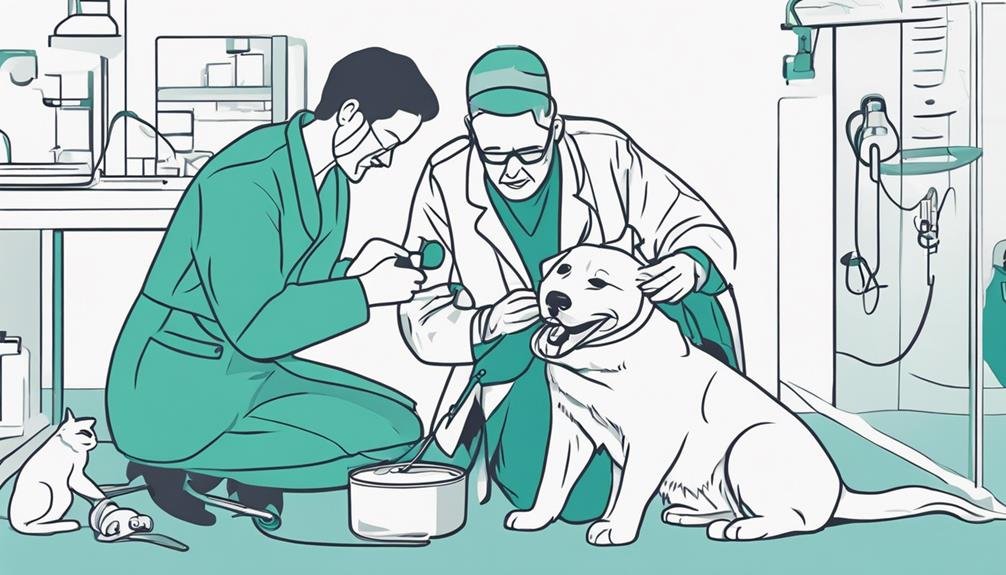To become a vet, you must hone your medical expertise, communication skills, and empathy. Your ability to provide exceptional medical care to animals is vital, encompassing medical knowledge and diagnostic proficiency. Effective communication with pet owners and colleagues fosters a supportive environment and enhances patient care. Showing empathy to both animals and their human companions can set you apart in this field. These essential skills form the foundation for success as a veterinarian, but there are other aspects to contemplate as well.
Key Takeaways
- Strong foundation in medical knowledge, surgical skills, and diagnostics.
- Excellent communication with clients and colleagues.
- Understanding animal behavior for accurate diagnosis.
- Problem-solving abilities for complex cases.
- Compassion, empathy, and composure in challenging situations.
Essential Veterinarian Skills

To excel in the veterinary field, it is necessary to possess a diverse set of essential skills that go beyond just medical expertise. As a good vet, you must not only have a solid foundation of medical knowledge, surgical abilities, and diagnostic proficiency but also cultivate strong communication skills, problem-solving skills, emotional intelligence, and the ability to adapt to changing circumstances. Your role as a veterinarian requires more than just treating animals; it demands essential qualities like compassion, empathy, and the ability to stay composed in challenging situations. Being able to effectively communicate with pet owners, colleagues, and other professionals in the field is pivotal for providing best care to your patients. Moreover, your problem-solving skills and emotional intelligence will play a significant role in diagnosing and treating animals, making you a well-rounded and competent veterinary professional.
Key Soft Skills for Veterinarians
An important aspect of excelling as a veterinarian lies in mastering key soft skills that complement your medical expertise. As a compassionate caregiver, effective communication with clients is essential to understand their concerns and provide clear treatment plans. Patience plays a vital role in calming animals during examinations and treatments, showcasing empathy towards both animals and their owners. Understanding animal behavior is crucial for diagnosing and treating animals efficiently, as it offers valuable insights into their health. Additionally, developing strong business acumen is vital for those aiming to own or manage a veterinary practice, requiring knowledge of regulations and financial management. Managing stress, being adaptable, proficient in veterinary software, and upholding ethical standards are all critical skills for veterinarians to deliver quality care while maintaining professionalism.
| Soft Skills | Description |
|---|---|
| Communication | Essential for understanding client concerns and providing clear treatment plans. |
| Patience | Crucial in calming animals during examinations and demonstrating empathy towards all involved. |
| Animal Behavior | Key to diagnosing and treating animals effectively by interpreting their behavior. |
| Business Acumen | Important for managing a veterinary practice, encompassing regulatory and financial knowledge. |
| Professionalism | Upholding ethical standards and delivering quality care while maintaining a professional demeanor. |
Critical Veterinary Abilities

Developing vital veterinary abilities is fundamental for excelling in the field of veterinary medicine. As a veterinarian, your success hinges on a combination of technical expertise and soft skills. Your medical knowledge, diagnostic abilities, and attention to detail form the foundation of your veterinary skills. These skills enable you to diagnose and treat a wide range of medical conditions in animals effectively. However, beyond the technical aspects, your ability to communicate with clients, show empathy towards animals, and understand their behavior are equally essential.
To thrive in this demanding profession, you must also possess problem-solving skills to tackle complex cases with confidence. Compassion, analytical skills, and interpersonal abilities will set you apart in providing exceptional care to your patients. Adaptability to changing demands, leadership within a team, and emotional intelligence are indispensable qualities that make a successful veterinarian. Mastering these vital veterinary abilities will not only benefit your practice but also enhance the well-being of the animals under your care.